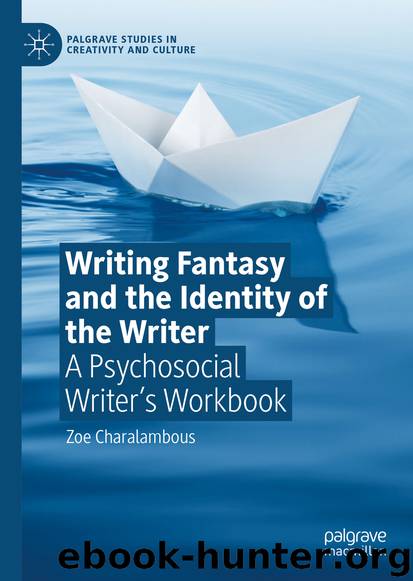Writing Fantasy and the Identity of the Writer by Zoe Charalambous

Author:Zoe Charalambous
Language: eng
Format: epub
ISBN: 9783030202637
Publisher: Springer International Publishing
M provided a variety of character elements here, unlike her text about the man climbing up a mountain. There are hints of a wider meaning: potentially that one’s embarrassing moments or one’s loneliness may be transformed to art. This meaning is left for the end, and open for the reader to construct. Rather than directly telling the reader the character’s emotions, there are concrete details such as ‘underneath a lacy-white parasol,’ or ‘which formed exactly one corner in her lounge’ and associations to her name. What follows the above extract is also detailed, and even though it is the main incident of the whole narration, it does not seem that there is a rush to get to it. It is a short yet intimate description of how Violet feels, starting from her bodily sensations in the warm weather and then moving on to a paragraph about her fantasy about the young boy, Frederick. This description may have been affected by the two instructions that refer to using metaphors and detail in description: “Write a metaphor, and 3. Use at least one image for one of the senses.” No “meaning” is named in this text. We read the sensory experience of the character’s feelings, showing us, instead of telling us.
There is also a very different portrayal of the female protagonist in this text. The women portrayed in her other texts are “almost ashamed” or are “shamed,” but do not “do” anything with their shame. Similarly, for instance, the daughter in her “Free-Write” text does not talk back to her mother’s reprimands about wearing baggy jeans. Violet, in contrast, fails to get Frederick’s attention by ‘waving her arms frantically’ and doing ‘a little dance-salsa to be exact’ (M’s text). Yet, she transforms her ‘ridiculous dance’ into a ‘show piece’ (M’s text): her shame into art. If we consider that M is fearful of indulging in the personal, since this feels uncomfortable to her, this turning of “shame” into art, could oddly be sublimating M’s feeling of Otherness in a double bind—both for the protagonist and for the author of this story.
In the final interview, M also provided an account of the text she wrote to the exercise “Use the Mirror Given To You and Write What You See in Its Reflection.” She said that she ‘automatically thought it was about [her]’ (M266). In response to that, when I told her that she has said that she does not write directly about herself usually, M seemed to attempt to name her fear:M269: yea I think it’s probably my fear … there was … [giggles nervously]
Download
This site does not store any files on its server. We only index and link to content provided by other sites. Please contact the content providers to delete copyright contents if any and email us, we'll remove relevant links or contents immediately.
The Art of Coaching Workbook by Elena Aguilar(51198)
Trainspotting by Irvine Welsh(21665)
Twilight of the Idols With the Antichrist and Ecce Homo by Friedrich Nietzsche(18632)
Fangirl by Rainbow Rowell(9249)
Periodization Training for Sports by Tudor Bompa(8271)
Change Your Questions, Change Your Life by Marilee Adams(7780)
This Is How You Lose Her by Junot Diaz(6886)
Asking the Right Questions: A Guide to Critical Thinking by M. Neil Browne & Stuart M. Keeley(5775)
Grit by Angela Duckworth(5614)
Red Sparrow by Jason Matthews(5472)
Paper Towns by Green John(5191)
Room 212 by Kate Stewart(5120)
Ken Follett - World without end by Ken Follett(4731)
Housekeeping by Marilynne Robinson(4447)
The Sports Rules Book by Human Kinetics(4386)
Papillon (English) by Henri Charrière(4274)
Double Down (Diary of a Wimpy Kid Book 11) by Jeff Kinney(4271)
The Motorcycle Diaries by Ernesto Che Guevara(4098)
Exercise Technique Manual for Resistance Training by National Strength & Conditioning Association(4071)
